Mood:
Topic: Funny Stuff
 Supreme Court Justices, post Sandra Day O'Connor
Supreme Court Justices, post Sandra Day O'Connor 


Posted by uhyw
at 1:34 AM EDT
Entries by Topic
All topics « Columns Funny Stuff Lib Loser Stories My Columns News Odd Stuff Yahoo Chat Stuff
My Personal Sites / News Links
New Blog, Nov 07 - Old Blog, Nov-July 07 Old Blog, May-Nov 06 Old Blog, Feb-May 06 Old Blog, Oct-Feb 06 Old Blog, Mar-Sep 05 MySpace - Chris MyLot yaahoo_laziest Hall of Fucktard Fame Fox Babe Kiran Chetry ABC News American Spectator AP Breaking News Bloomberg Breitbart Cybercast News Svc. Drudge Report EVOTE.com FOX News Free Republic Laura Ingraham Mark Levin National Review Neal Boortz NewsMax.com NY Sun Opinion Journal Real Clear Politics Roll Call Smoking Gun The Hill Town Hall USA Today US News & World Rpt Washington Times Weekly Standard
More News Links
Amer. Conservative Atlanta Journal & C Ananova UK News BBC Bill O'Reilly.com CNET Tech News CS Monitor Dick Morris.com Dow Jones Frontpage Mag Georgia Lottery Human Events Inside Beltway Inside Politics Knight Ridder (DC) Lucianne.com Michael Savage NY Times Opensecrets.org Rush Limbaugh Sean Hannity The Onion UK Guardian UK Independent Wired News World Net Daily Yahoo News
Columns / E-mail
Michael Barone Bill Bennett Brent Bozell III Pat Buchanan Bill Buckley Ann Coulter.com Ann Coulter (H.E.) Ann Coulter (T.H.) C. Krauthammer Larry Kudlow John Leo David Limbaugh Michelle Malkin (H.E.) Michelle Malkin (T.H.) Michael Medved Robert Novak Bill O'Reilly (H.E.) Bill O'Reilly (T.H.) Michael Reagan Joe Scarborough Thomas Sowell John Stossel Cal Thomas George Will Walter Williams Hotmail Juno e-mail My Way e-mail Yahoo Mail
Polling / Reference
American History Arbitron Ratings Birthday Calculator Campaign Line Congress.org C-Span Day Counter Executive Branch Gallup Judicial Branch Legislative Branch Library of Congress Map Quest Media Research Ctr. Merriam-Webster Online Dictionary NASA.gov Polling Report President Elect Rasmussen Reports Stock Market Supreme Court Media US Dept. of Defense US House US Senate US Supreme Court White House White Pages Zogby
Other Blogs
21st Ctry Republican Alpaca Burger Forum American Scene American Thinker Ankle Biting Pundits BeldarBlog Blogs Against Hillary Blogs for Bush Captain's Quarters Consrvtv Grapevine Crosswalk Dummocrats Euphoric Reality Expose The Left Hot Air.com Instapundit It's Happening Forum Jihad Watch Little Green Footballs * Michelle Malkin.com Museum of Lib Lunacy Newhouse News Svc. News Busters No Left Turns OxBlog Pajamas Media Pardon My English Political Pit Bull Political Wire Pork Reports Power Line Protest Warrior Reagan's Children Red State RightNation.US Right Wing News Right Wing Nut House The Politico The Radio Equalizer Weekly Diatribe WizBang Xtreme Right Wing
Yahoo Chat Champs
Our dearly departed, good friend's site - John Blast Calling ___________________ In Memory of blast_from_the_past - Guestbook Site ___________________ Operation We Do Care wecoyote6969's Everyday People Radio ___________________ liberalshavearight toremainstupid's - Surfcams ___________________ zone_rocks32's World Wire News ___________________ armywife4bush's Briefcase |
Kick Assiest Blog
Friday, July 8, 2005
The Reoccurring Nightmare Ted Kennedy Has Been Having For The Last Week
Mood: Topic: Funny Stuff  Supreme Court Justices, post Sandra Day O'Connor Supreme Court Justices, post Sandra Day O'Connor 
Posted by uhyw
at 1:34 AM EDT
U.S. Budget Deficit Tumbles
Mood: Topic: News 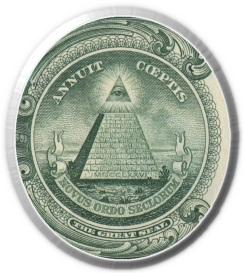 U.S. Budget Deficit Tumbles, Congressional Analysts Say
WASHINGTON - Higher-than-expected tax receipts and the steadily growing economy have combined to produce an improved picture for the federal budget deficit, congressional analysts say.
The deficit for the current budget year, which runs through Sept. 30, should be "significantly less than $350 billion, perhaps below $325 billion," according to the Congressional Budget Office. The agency produces nonpartisan estimates for Congress and will put out a full update Aug. 15.
Thursday's new figures come as the White House is to release its midyear budget review July 13. Administration figures are also expected to show significant improvement from the $427 billion current-year deficit it predicted in January. U.S. Budget Deficit Tumbles, Congressional Analysts Say
WASHINGTON - Higher-than-expected tax receipts and the steadily growing economy have combined to produce an improved picture for the federal budget deficit, congressional analysts say.
The deficit for the current budget year, which runs through Sept. 30, should be "significantly less than $350 billion, perhaps below $325 billion," according to the Congressional Budget Office. The agency produces nonpartisan estimates for Congress and will put out a full update Aug. 15.
Thursday's new figures come as the White House is to release its midyear budget review July 13. Administration figures are also expected to show significant improvement from the $427 billion current-year deficit it predicted in January.
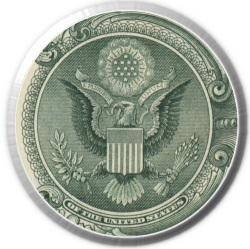 Last year's $412 billion deficit was a record in dollar terms, but economists say the more significant measure is against the size of the economy. In those terms, the current deficit picture - a $350 billion deficit for this year would equal 2.9 percent of gross domestic product - is significantly better than deficits witnessed in the mid-1980s and early 1990s. Then, deficits of 4 percent to 6 percent of GDP were common.
The biggest factors for the improving deficit picture are higher tax receipts from corporations and individuals. The economy is performing slightly above earlier administration expectations.
Despite the improvement projected over the short term, neither the CBO nor the administration's Office of Management and Budget is expected to dramatically overhaul its long-term deficit projections, which show a steady decline in the level of red ink through the end of the decade but anticipate a spike in the deficit soon thereafter as the baby boom generation claims its retirement benefits.
"This is good, but let's try to figure out if there's anything permanent here," said CBO Director Douglas Holtz-Eakin.
Still, the new numbers will make it easier for the White House to credibly claim it will meet its goal of cutting the deficit in half - from the $521 billion it originally predicted for fiscal 2004 - by the time President Bush leaves office. Budget watchdog groups like the bipartisan Concord Coalition say White House budget projections are suspect since they leave out long-term costs for the war in Iraq and other factors. Last year's $412 billion deficit was a record in dollar terms, but economists say the more significant measure is against the size of the economy. In those terms, the current deficit picture - a $350 billion deficit for this year would equal 2.9 percent of gross domestic product - is significantly better than deficits witnessed in the mid-1980s and early 1990s. Then, deficits of 4 percent to 6 percent of GDP were common.
The biggest factors for the improving deficit picture are higher tax receipts from corporations and individuals. The economy is performing slightly above earlier administration expectations.
Despite the improvement projected over the short term, neither the CBO nor the administration's Office of Management and Budget is expected to dramatically overhaul its long-term deficit projections, which show a steady decline in the level of red ink through the end of the decade but anticipate a spike in the deficit soon thereafter as the baby boom generation claims its retirement benefits.
"This is good, but let's try to figure out if there's anything permanent here," said CBO Director Douglas Holtz-Eakin.
Still, the new numbers will make it easier for the White House to credibly claim it will meet its goal of cutting the deficit in half - from the $521 billion it originally predicted for fiscal 2004 - by the time President Bush leaves office. Budget watchdog groups like the bipartisan Concord Coalition say White House budget projections are suspect since they leave out long-term costs for the war in Iraq and other factors.
 "The numbers are coming out better," said White House budget director Joshua B. Bolten in an interview last month. "We had projected a very steady path of decline of the deficit, especially as a percentage of GDP, which is the right way to judge it. Right now, we're doing better than hitting that target. They'll be better because we've gotten better revenues than we originally projected."
As it addresses the deficit, the White House has focused chiefly on clamping down on domestic programs whose budgets are appropriated every year by Congress. That's only about one-sixth of the overall budget, however. Congress is also planning a five-year, $35 billion cut from automatically budgeted programs such as Medicaid and farm subsidies.
"The long-term budget issues are the mandatory programs - Social Security, Medicare, Medicaid. Everything else is dwarfed by that," Holtz-Eakin said. He added that the current improvement in the deficit picture "looks like a pittance" when compared with the long-term liabilities.
Tampa Bay Online ~ Associated Press - Andrew Taylor ** U.S. Budget Deficit Tumbles, Congressional Analysts Say "The numbers are coming out better," said White House budget director Joshua B. Bolten in an interview last month. "We had projected a very steady path of decline of the deficit, especially as a percentage of GDP, which is the right way to judge it. Right now, we're doing better than hitting that target. They'll be better because we've gotten better revenues than we originally projected."
As it addresses the deficit, the White House has focused chiefly on clamping down on domestic programs whose budgets are appropriated every year by Congress. That's only about one-sixth of the overall budget, however. Congress is also planning a five-year, $35 billion cut from automatically budgeted programs such as Medicaid and farm subsidies.
"The long-term budget issues are the mandatory programs - Social Security, Medicare, Medicaid. Everything else is dwarfed by that," Holtz-Eakin said. He added that the current improvement in the deficit picture "looks like a pittance" when compared with the long-term liabilities.
Tampa Bay Online ~ Associated Press - Andrew Taylor ** U.S. Budget Deficit Tumbles, Congressional Analysts Say
Posted by uhyw
at 1:19 AM EDT
North Korean propaganda film backfires
Mood: Topic: Yahoo Chat Stuff North Korean propaganda film backfires with hungry audiences SEOUL - A North Korean propaganda film about the repatriation of a spy — Lee In-Mo — who had languished for years in a South Korean prison may have a short shelf life, according to defectors now living in the South. "What we could not believe in the movie was that Lee and others were conducting hunger strikes in the prison," said one defector about the movie. "Refusing to eat was a form of resistance in the South? Boy, South Korea must be a paradise. That's what we said among ourselves" One of the first things South Korean President Kim Young-Sam did upon his inauguration in 1993 as the first popularly elected civilian president was to repatriate a long-term prisoner, Lee In-Mo, back to North Korea. Lee, 76, was a North Korean spy dispatched during the early days of Korean War (1950-53) and became a partisan when he missed the chance to go back before the cease-fire agreement was signed. He was captured at the age of 33 and spent 42 years in South Korean prisons. When the government in Seoul released spies and partisans in exchange for letters rejecting communist ideology and pledges to become loyal South Korean citizens, Lee and 62 other communists refused and opted to remain in prison. Lee was released for ill health and old age. North Korea appears on the brink of famine — July 3 North Korea demanded his repatriation, but Seoul hesitated knowing that he would be used for propaganda against the South. After all, his was a case made to order for propaganda: faith in the socialist system, dedication for a cause (national unification), and four decades in prison and unflinching loyalty. After much debate on the pros and cons of repatriating Lee, the Kim Young-Sam government decided to send him back in a humanitarian spirit (62 others were later sent back by President Kim Dae-Jung) and to attempt a breakthrough in the deadlocked South-North relations. Lee received a hero's welcome and, sure enough, Pyongyang made a film on Lee's "heroic struggle for the motherland" in South Korean prisons and made sure all North Koreans saw it. However, the movie caused many North Koreans to become curious about South Korean society. Many North Korean defectors said their first reaction upon seeing the film was to ask how people could stay in prison for more than 10 years and remain alive? They say few people survive even three years in North Korean political prisons. Being fed three regular meals a day is utterly unimaginable. Political prisoners die from disease and malnutrition, if not from torture, as documented by Kang Chul-Won in his best-selling book, "Aquariums of Pyongyang," which recently led him to be invited by President Bush to the White House. The North Korean defectors said the movie had the opposite effect from what was intended. One wondered if Pyongyang is still showing the movie to the people. "I bet they are not," he said. World Tribune.com ** North Korean propaganda film backfires with hungry audiences
Thursday, July 7, 2005
Bad News Day... Missing Iowa Girl, 5, Found Dead
Mood: Topic: News Missing Iowa Girl, 5, Found Dead CHARLES CITY, Iowa - A young girl found dead in a river is believed to be a 5-year-old whose disappearance last week prompted a frantic search, authorities said Thursday.
Searchers found the body about 7:40 p.m. Wednesday in the Cedar River, a couple of miles from little Evelyn Miller's home in Floyd, Floyd County Attorney Marilyn Dettmer said. A positive identification was pending but Dettmer said it's believed the body is Evelyn, who disappeared last Friday. An autopsy was planned. Dettmer also said contrary to earlier reports, no arrests had been made and the investigation was continuing. The child's grandfather had said one person was arrested. Dettmer did not explain the discrepancy, or give detail on how the body was found or a possible cause of death. Hundreds of volunteers had joined in the search. Noel Miller, Evelyn's mother, has said she left her children, Evelyn, Gabriel, 2, and Damian, 1, with her fiance, Casey Fredericksen, at their apartment in Floyd, a small farming community about 110 miles northeast of Des Moines. When she arrived home from her overnight job later Friday morning, the apartment door was slightly open and Evelyn was gone. Mary Neubauer, a spokeswoman for family members, said they are devastated. "We all believed Evelyn would be found and we'd bring her home safe," she said. The grandfather, Richard Christie of Des Moines, told KWWL-TV in Waterloo and The Gazette in Cedar Rapids that he learned late Wednesday that his granddaughter's body was found. "She was murdered and her body was put in the river," Christie told the newspaper. "She was not drowned." Evelyn was last seen by two acquaintances of her mother's fiance about 2 a.m. Friday, asleep on a loveseat in the family's apartment. Those two men have been questioned by authorities and a search of their home was conducted. But authorities have not called them suspects. Authorities have said Fredericksen, 26, passed a lie-detector test. Andy Christie, Evelyn's father, and his wife, Lindsey, said at a news conference earlier Wednesday they still hoped to find the girl alive. They recently found an abandoned puppy and planned to give the pup to Evelyn. "We haven't named him yet," Andy Christie said. "We are waiting until Evvy gets home, so she can name him." Fox News ~ Associated Press ** Missing Iowa Girl, 5, Found Dead
Londoner Eyewitnesses Tell of Rush Hour From Hell
Mood: Topic: News 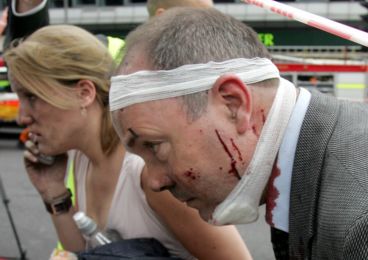 The injured are lead away from the Edgware Road Tube Station, attacked by a terrorist bomb in London. >>>>>
Eyewitnesses tell of travel hell
At least 33 people have been killed and hundreds injured after a series of explosions on the London Underground network and a bus in central London.
Eyewitnesses tell what they have seen and heard from around the capital.
♠ DAVID JONES, TAVISTOCK SQUARE The injured are lead away from the Edgware Road Tube Station, attacked by a terrorist bomb in London. >>>>>
Eyewitnesses tell of travel hell
At least 33 people have been killed and hundreds injured after a series of explosions on the London Underground network and a bus in central London.
Eyewitnesses tell what they have seen and heard from around the capital.
♠ DAVID JONES, TAVISTOCK SQUARESuddenly there was this thud, people on the bus said there's been an explosion behind us and people rushed to the front. I said to people not to panic, keep calm. People evacuated our bus. There was not a lot of fire but there was the smell of an explosion and at that point people wanted to walk away from what they had seen. There was no glass falling... there was a thud and the roof had come off. I suppose, to be honest, my first thought was G8, Olympics, somebody does not want London to celebrate. ♠ UNNAMED WITNESS, TAVISTOCK SQUARE I was walking along. There was a crowd of people around the bus. The next thing I knew I was on the floor. There was shedloads of glass raining down. Someone fell on me and someone fell on him. For a moment I thought I was going to be trampled. I picked myself up and everyone was running. There was glass everywhere. We ran into a building and a security guard was saying `get in, get in'. Then the security guard said `get out'... which was a bit scary. I saw the bus ripped out at the back ... it couldn't have been anything else [but a terrorist attack]. ♠ BELINDA SEABROOK, RUSSELL SQUARE I was on the bus in front and heard an incredible bang, I turned round and half the double-decker bus was in the air. It was a massive explosion and there were papers and half a bus flying through the air. There must be a lot of people dead as all the buses were packed, they had been turning people away from the tube stops. We were about 20 metres away, that was all. ♠ GERALDINE FOURMON, TAVISTOCK SQUARE There was a big bang. After the smoke went away I realised there was a double decker bus exploded. People were running towards me screaming and crying. I saw at least five people jump from the top deck of the bus. Half of it was blown away. They were jumping onto the street to escape. It was such a big explosion and the bus was packed because the tube was closed. People were covered with dust and debris. I didn't see any blood. ♠ ANDY ABERNETHY, LONDON It was a train on the Piccadilly line between King's Cross and Russell Square and literally it was just a very loud bang. The train derailed. There was smoke everywhere. There was no fire but the smoke was quite oppressive. There were a lot of serious injuries down there as well. A lot of serious head injuries. A guy by me thought he was going to die, I'm hoping he got out OK. ♠ JACQUI HEAD, KING'S CROSS Suddenly there was a massive bang, the train jolted. There was immediately smoke everywhere and it was hot and everybody panicked. People started screaming and crying. It was very scary while we were stuck on the train. Very silent and we were thinking we were not going to get out. People thought they were just going to suffocate. ♠ TAS FRANGOULLIDES, KING'S CROSS The train didn't get very far out of the station when there was an explosion. Loads of glass showered down over everyone, the glass in the doors in between all the carriages shattered. 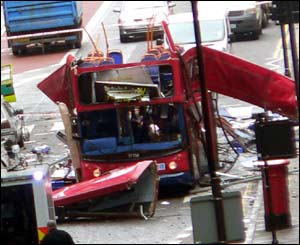 There was a lot of smoke and a lot of dust, there were some areas of panic, I could hear screams. People were trying to work out what happened.
A lot of people were covered in blood.
I started walking towards Russell Square then I saw the bus. Police were running from the scene and waving people away.
I had to walk to work because I had to try and do something normal, it was all so chaotic.
It wasn't till I got to work that I realised I had a cut on my head and my clothes were covered in dust. There was a lot of smoke and a lot of dust, there were some areas of panic, I could hear screams. People were trying to work out what happened.
A lot of people were covered in blood.
I started walking towards Russell Square then I saw the bus. Police were running from the scene and waving people away.
I had to walk to work because I had to try and do something normal, it was all so chaotic.
It wasn't till I got to work that I realised I had a cut on my head and my clothes were covered in dust.
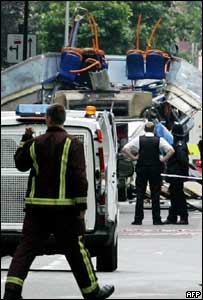 ----------------------------------------------------------------- -----------------------------------------------------------------"In the aftermath of the explosion on a bus in Tavistock Square strangers recounted to each other what they heard and saw" In the aftermath ----------------------------------------------------------------- ♠ FIONA TRUEMAN, KING'S CROSS It was about three minutes after we left King's Cross, when there was a massive bang and there was smoke and glass everywhere - I was standing near a window, and I've still got some in my hair. The lights went out, and with the smoke, we couldn't breathe, and we sort of cushioned each other during the impact because the compartment was so full. It felt like a dream, it was surreal. It was just horrendous, it was like a disaster movie, you can't imagine being somewhere like that, you just want to get out. I kept closing my eyes and thinking of outside. It was frightening because all the lights had gone out and we didn't hear anything from the driver, so we wondered how he was. Overall I feel lucky, and my thoughts go out to the families of anyone who has died. ♠ ARASH KAZEROUNI There was a loud bang and the train ground to a halt. People started panicking, screaming and crying as smoke came into the carriage. A man told everyone to be calm and we were led to safety along the track. Everyone was terrified when it happened. When they led us to safety, I went past the carriage where I think the explosion was. It was the second one from the front. The metal was all blown outwards and there were people inside being helped by paramedics. One guy was being tended outside on the track. His clothes were torn off and he seemed pretty badly burned. ♠ ANA CASTRO, LIVERPOOL STREET People were screaming and shouting and saying things like I'm dying, I'm dying, please help me. I saw people just standing there in their underwear as if their clothes had been ripped off [by the explosion]. I think I saw somebody who was dead it was just indescribable. ♠ LISA CURTIS, NEAR LIVERPOOL STREET People were evacuated immediately. I overheard one lady saying to a police officer that it looked like someone had left what looked like a brown jumper on the platform and it exploded. Smoke filled the platform and people were evacuated. ♠ SARAH REID, NEAR LIVERPOOL STREET I was on the train and there was a fire outside the carriage window and then there was a sudden jolt which shook us forward. The explosion was behind me. Some people took charge. We went out of the back of the carriage. There was really hard banging from the carriage next door to us. That was where it happened. A carriage was split in two, all jagged, and without a roof, just open. I saw bodies, I think... some people may have died. ♠ SCOTT WENBOURNE, ALDGATE I saw three bodies on the track. I couldn't look, it was so horrific. I think one was moving but I'm not too sure. There were also, I think, some bodies in the carriage, some were moving but I couldn't really look. No-one was attending to them. We walked to the platform, which took about half an hour as there were so many of us, after all it was rush hour. There were police at the platform and some of the injured were tended to. ♠ JACK LINTON, 14, ALDGATE There was a massive explosion, smoke and flames. My carriage must have been two away from where it was. Everybody got on the floor. Then eventually the smoke cleared and we managed to open the central doors down the train to go to the back of it before they walked us along the track past the train to the station. The middle of the train was blown out and there were people on the track. I've got glass in my hair and my pockets and my ear hurts. ♠ SIMON CORVETT, EDGWARE ROAD All of sudden there was this massive huge bang. It was absolutely deafening and all the windows shattered. The glass did not actually fall out of the windows, it just cracked. The train came to a grinding halt, everyone fell off their seats. There were just loads of people screaming and the carriages filled with smoke. You couldn't really breathe and you couldn't see what was happening. The driver came on the tannoy and said `We have got a problem, don't panic'. You could see the carriage opposite was completely gutted. There were some people in real trouble. 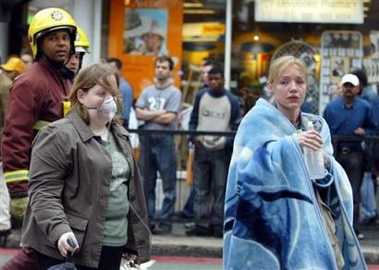 --------------------------------- ---------------------------------Injured tube passengers are escorted away from Edgware Road Tube Station in London following an explosion, Thursday July 7, 2005.Several blasts went off on the London subway and on at least one double-decker bus during the morning rush hour Thursday, police said, injuring riders and prompting officials to shut down the entire underground transport network. British Home Secretary Charles Clarke said there had been 'terrible injuries.' --------------------------------- BBC News ** Eyewitnesses tell of travel hell Related Story... Yahoo News ~ Associated Press Sports Writer - Robert Millward ** London Olympic Jubilation Turns to Horror
Posted by uhyw
at 12:45 PM EDT
Updated: Thursday, July 7, 2005 1:09 PM EDT
Wednesday, July 6, 2005
CBS Mulls New Evening News Format... Explores Storytelling
Mood: Topic: Lib Loser Stories CBS News explores storytelling The project is one of the first indications of how CBS might restructure the evening news. NEW YORK - Faced with a mandate to remake the network's nightly news broadcast, CBS News President Andrew Heyward has commissioned staffers to come up with specific approaches that would favor more of a storytelling style over the traditional format that generally recaps the news of the day. Heyward told correspondents and producers, whom he's pulled in to help develop the project, about the new concept for the "CBS Evening News" in a meeting held at the network's West 57th Street headquarters Thursday and again in a smaller gathering Tuesday, a CBS News executive confirmed. "We're experimenting this summer with new, interesting ideas for how to tell stories in a more interesting and compelling way," said Marcy McGinnis, senior vice president for news gathering, who declined to give further details about the meetings. According to two editorial employees who were at the meetings, the news president asked the staff to gather additional material as part of their current assignments that can be used to experiment with various styles of storytelling. He plans to present the sample idea to CBS Chairman Leslie Moonves in the coming months, with the hope that details about the revamped nightly news broadcast could be announced by the fall. Heyward's project is one of the first indications of how CBS might restructure the evening news, which has long lagged behind NBC and ABC in the ratings and has been under even more scrutiny since veteran anchor Dan Rather stepped down in March, following a much-criticized report he did last year on President Bush's National Guard service for "60 Minutes Wednesday." 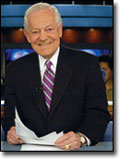 The network has used Bob Schieffer, another veteran staffer, to temporarily fill the anchor spot while it ponders a new format for the program.
Moonves has made it clear that he wants CBS to rethink the approach of the broadcast, which, like other network news programs, has steadily lost viewers in the last decade.
Thus far, news executives have been vague about their plans. At a CBS affiliates meeting in Las Vegas last month, Heyward told station representatives that the broadcast was in a "process of evolution."
He told them that the revamped newscast will rely heavily on a team of correspondents and put less emphasis on "a dominant anchor surrounded by a bunch of people you don't know and don't care about."
In the meetings with the staff, Heyward said that he hopes to develop a new version of the show that plays to the network's strengths — an experienced team of correspondents and its ability to do "great storytelling."
"What people walked away with was that we still have a commitment to news — we just have to package it differently," said one of the employees, who did not want to be named discussing internal conversations.
The new broadcast Heyward proposed would dispense quickly with the news of the day and focus on deeper investigative and feature stories, modeled after the kind of storytelling done on "60 Minutes," arguably CBS' most successful news program.
He also said the newscast could provide a measure of "transparency" by providing viewers a glimpse behind the scenes. An assistant producer could use a hand-held camera to film a correspondent making calls, for example.
The new "Evening News" could also include more on-screen graphics to give viewers a quick sampling of facts about a subject, Heyward suggested.
LA Times ~ Matea Gold ** CBS News explores storytelling The network has used Bob Schieffer, another veteran staffer, to temporarily fill the anchor spot while it ponders a new format for the program.
Moonves has made it clear that he wants CBS to rethink the approach of the broadcast, which, like other network news programs, has steadily lost viewers in the last decade.
Thus far, news executives have been vague about their plans. At a CBS affiliates meeting in Las Vegas last month, Heyward told station representatives that the broadcast was in a "process of evolution."
He told them that the revamped newscast will rely heavily on a team of correspondents and put less emphasis on "a dominant anchor surrounded by a bunch of people you don't know and don't care about."
In the meetings with the staff, Heyward said that he hopes to develop a new version of the show that plays to the network's strengths — an experienced team of correspondents and its ability to do "great storytelling."
"What people walked away with was that we still have a commitment to news — we just have to package it differently," said one of the employees, who did not want to be named discussing internal conversations.
The new broadcast Heyward proposed would dispense quickly with the news of the day and focus on deeper investigative and feature stories, modeled after the kind of storytelling done on "60 Minutes," arguably CBS' most successful news program.
He also said the newscast could provide a measure of "transparency" by providing viewers a glimpse behind the scenes. An assistant producer could use a hand-held camera to film a correspondent making calls, for example.
The new "Evening News" could also include more on-screen graphics to give viewers a quick sampling of facts about a subject, Heyward suggested.
LA Times ~ Matea Gold ** CBS News explores storytelling
Posted by uhyw
at 1:38 AM EDT
Updated: Wednesday, July 6, 2005 1:40 AM EDT
Tuesday, July 5, 2005
Pelosi Turns In Delinquent Reports for 3 Sponsor-Funded Trips
Mood: Topic: Lib Loser Stories 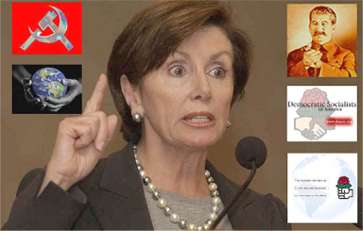 Pelosi Turns In Delinquent Reports for 3 Sponsor-Funded Trips
House Minority Leader Nancy Pelosi (D-Calif.) filed delinquent reports Friday for three trips she accepted from outside sponsors that were worth $8,580 and occurred as long as seven years ago, according to copies of the documents.
The filing is among hundreds of revisions from members of both parties who have amended missing or incomplete reports as scrutiny of lawmaker travel has intensified.
The most expensive trip was not reported on Pelosi's annual financial disclosure statement or on the travel disclosure form that is required within 30 days of a trip.
A more common violation among members filing corrections was to list a trip on the annual statement but not file the more detailed form about a specific trip. The House ethics committee plans to examine the tardy disclosures after being stalled since January in partisan disputes. Pelosi Turns In Delinquent Reports for 3 Sponsor-Funded Trips
House Minority Leader Nancy Pelosi (D-Calif.) filed delinquent reports Friday for three trips she accepted from outside sponsors that were worth $8,580 and occurred as long as seven years ago, according to copies of the documents.
The filing is among hundreds of revisions from members of both parties who have amended missing or incomplete reports as scrutiny of lawmaker travel has intensified.
The most expensive trip was not reported on Pelosi's annual financial disclosure statement or on the travel disclosure form that is required within 30 days of a trip.
A more common violation among members filing corrections was to list a trip on the annual statement but not file the more detailed form about a specific trip. The House ethics committee plans to examine the tardy disclosures after being stalled since January in partisan disputes.
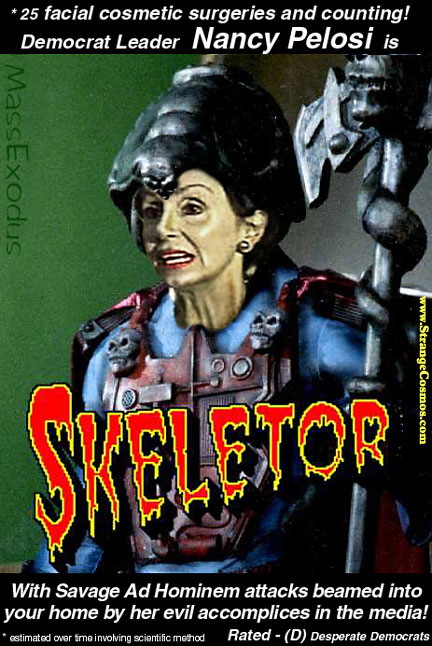 Committee members have shown no appetite for taking up all those cases and are considering an amnesty for reporting violations, although not for serious matters such as accepting a trip from a lobbyist, which House rules forbid. The data firm PoliticalMoneyLine calculates that members of Congress have received more than $18 million in travel from private organizations in the past five years, with Democrats taking 3,458 trips and Republicans taking 2,666.
Pelosi, who was elected House Democratic leader in November 2002, said in a letter to the ethics committee: "Although the current travel issue has focused on trips that have taken place since 2000, I have further reviewed my record of privately funded travel prior to becoming part of the Democratic Leadership." She said that "as a result," she was filing three forms, two for trips that she had reported on her annual statements.
The unreported trip was a week-long 1999 visit to Taiwan, paid for by the Chinese National Association of Industry and Commerce, for "meetings with government, military and business officials," according to a filing Pelosi signed June 30. The flights cost $3,400 each for Pelosi and her husband. The hotel cost was $940. The sponsor, which has picked up trips for leaders of both parties, paid $300 for meals.
Pelosi said she had provided "a good faith estimate" of the cost of the other two trips, since her "office records for that period do not indicate the costs." In 1998, NBC paid for a $200 trip to New York for a "Meet the Press" appearance, according to the filing. In 1999, the American Israel Public Affairs Committee paid $300 for transportation to Delray Beach, Fla., and $40 for meals for Pelosi to appear at a reception and briefing.
Rep. Jack Kingston (R-Ga.), vice chairman of the House Republican Conference, said the filing is new evidence that the focus on House Majority Leader Tom DeLay (R-Tex.) has been disproportionate. "Democrats have just as many substantive questions," Kingston said.
Washington Post ~ Mike Allen ** Pelosi Turns In Delinquent Reports for 3 Sponsor-Funded Trips Committee members have shown no appetite for taking up all those cases and are considering an amnesty for reporting violations, although not for serious matters such as accepting a trip from a lobbyist, which House rules forbid. The data firm PoliticalMoneyLine calculates that members of Congress have received more than $18 million in travel from private organizations in the past five years, with Democrats taking 3,458 trips and Republicans taking 2,666.
Pelosi, who was elected House Democratic leader in November 2002, said in a letter to the ethics committee: "Although the current travel issue has focused on trips that have taken place since 2000, I have further reviewed my record of privately funded travel prior to becoming part of the Democratic Leadership." She said that "as a result," she was filing three forms, two for trips that she had reported on her annual statements.
The unreported trip was a week-long 1999 visit to Taiwan, paid for by the Chinese National Association of Industry and Commerce, for "meetings with government, military and business officials," according to a filing Pelosi signed June 30. The flights cost $3,400 each for Pelosi and her husband. The hotel cost was $940. The sponsor, which has picked up trips for leaders of both parties, paid $300 for meals.
Pelosi said she had provided "a good faith estimate" of the cost of the other two trips, since her "office records for that period do not indicate the costs." In 1998, NBC paid for a $200 trip to New York for a "Meet the Press" appearance, according to the filing. In 1999, the American Israel Public Affairs Committee paid $300 for transportation to Delray Beach, Fla., and $40 for meals for Pelosi to appear at a reception and briefing.
Rep. Jack Kingston (R-Ga.), vice chairman of the House Republican Conference, said the filing is new evidence that the focus on House Majority Leader Tom DeLay (R-Tex.) has been disproportionate. "Democrats have just as many substantive questions," Kingston said.
Washington Post ~ Mike Allen ** Pelosi Turns In Delinquent Reports for 3 Sponsor-Funded Trips
Posted by uhyw
at 3:46 PM EDT
Monday, July 4, 2005
Canada Declares War on Fox News
Mood: Topic: Lib Loser Stories 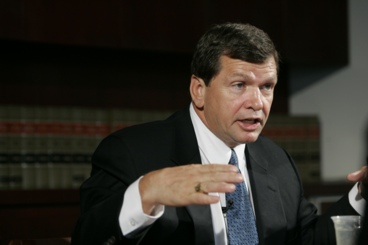 Canada's Ambassador Declares War on Fox News
Canada's ambassador to the United States has launched an all-out war on Fox News Channel.
Ambassador Frank McKenna has undertaken a public relations effort to reach the more than 1 million Canadians living in the United States, a group he calls the "Canadian diaspora."
McKenna says the effort is to boost support for Canada here, and to counter what he says is the "Fox factor," referring to the Fox News Channel, America's most popular cable news network, and its most highly rated show, "The O'Reilly Factor."
McKenna told the Toronto Star that he wants to arm Canadians with facts that will enable them to debate Americans and to lobby when Washington makes decisions that can hurt Canadians. Canada's Ambassador Declares War on Fox News
Canada's ambassador to the United States has launched an all-out war on Fox News Channel.
Ambassador Frank McKenna has undertaken a public relations effort to reach the more than 1 million Canadians living in the United States, a group he calls the "Canadian diaspora."
McKenna says the effort is to boost support for Canada here, and to counter what he says is the "Fox factor," referring to the Fox News Channel, America's most popular cable news network, and its most highly rated show, "The O'Reilly Factor."
McKenna told the Toronto Star that he wants to arm Canadians with facts that will enable them to debate Americans and to lobby when Washington makes decisions that can hurt Canadians.
 But most importantly, he says, Canadians in the U.S. should counteract Fox News, alleging that the network often spreads disinformation and creates a false picture of his homeland.
"We know we're a bit of prey for the Fox News type of shows," he told the Star.
The ambassador said he has sent out 6,000 pieces of literature to Canadians in his battle with Fox, and plans to mail to some 100,000 Canadians in the weeks ahead.
McKenna said he launched this campaign because "having dinner every month or two with some interesting people is not enough to move" Washington. But most importantly, he says, Canadians in the U.S. should counteract Fox News, alleging that the network often spreads disinformation and creates a false picture of his homeland.
"We know we're a bit of prey for the Fox News type of shows," he told the Star.
The ambassador said he has sent out 6,000 pieces of literature to Canadians in his battle with Fox, and plans to mail to some 100,000 Canadians in the weeks ahead.
McKenna said he launched this campaign because "having dinner every month or two with some interesting people is not enough to move" Washington.
 The ambassador hopes that his new network of Canadians "will be in the millions."
"Then all of a sudden we've multiplied our efforts exponentially and we have a lot more people out there armed with information," he said.
Calling on Canadians wintering in Florida, retirees in Arizona, Hollywood comedians and actors, investment bankers in New York and professors and students at universities across the United States, McKenna said they should carry these messages to Americans:
♣ Canada is the largest source of imported crude oil in the U.S., bigger than Saudi Arabia or the yet untested reserves of Iraq.
♣ Canada has rotated 13,500 troops in the war on terror, has committed $300 million to rebuilding Iraq and is about to deploy a reconstruction team to Afghanistan.
♣ None of the Sept. 11, 2001, terrorists entered the U.S. from Canada.
♣ Canada-U.S. trade supports more than 5 million American jobs.
Said McKenna: "We have to be very careful about overblown rhetoric. We don't get a lot of attention here, but we can get attention here for the wrong reasons.
"We have to be careful that we're not sanctimonious. We have to recognize the United States has assumed a different role in the world than us and it's a role we're not prepared to play.
"So we shouldn't be so judgmental about a country that has chosen to play that role."
But as far as Fox News is concerned, that seems to be a different story.
NewsMax.com ~ Carl Limbacher ** Canada's Ambassador Declares War on Fox News The ambassador hopes that his new network of Canadians "will be in the millions."
"Then all of a sudden we've multiplied our efforts exponentially and we have a lot more people out there armed with information," he said.
Calling on Canadians wintering in Florida, retirees in Arizona, Hollywood comedians and actors, investment bankers in New York and professors and students at universities across the United States, McKenna said they should carry these messages to Americans:
♣ Canada is the largest source of imported crude oil in the U.S., bigger than Saudi Arabia or the yet untested reserves of Iraq.
♣ Canada has rotated 13,500 troops in the war on terror, has committed $300 million to rebuilding Iraq and is about to deploy a reconstruction team to Afghanistan.
♣ None of the Sept. 11, 2001, terrorists entered the U.S. from Canada.
♣ Canada-U.S. trade supports more than 5 million American jobs.
Said McKenna: "We have to be very careful about overblown rhetoric. We don't get a lot of attention here, but we can get attention here for the wrong reasons.
"We have to be careful that we're not sanctimonious. We have to recognize the United States has assumed a different role in the world than us and it's a role we're not prepared to play.
"So we shouldn't be so judgmental about a country that has chosen to play that role."
But as far as Fox News is concerned, that seems to be a different story.
NewsMax.com ~ Carl Limbacher ** Canada's Ambassador Declares War on Fox News
Posted by uhyw
at 5:55 PM EDT
Father of Earth Day, who turned on his family?s Republican roots to become a liberal leader... died
Mood: Topic: Lib Loser Stories Former Dem Wisconsin Senator and Governor Gaylord Nelson turned on his family’s Republican roots to become a liberal leader. In addition to being the father of the Earth Day observance, he played a role in other environmental and liberal causes. GAYLORD NELSON: 1916-2005 / 3-term U.S. senator founded Earth Day / Liberal Democrat also served as Wisconsin governor Gaylord Nelson. Associated Press photo by Mark Hoffman \/
Gaylord A. Nelson, Founder of Earth Day, Is Dead at 89 Gaylord A. Nelson, a former senator from Wisconsin who was one of the architects of America's modern environmental movement and the founder of Earth Day, died yesterday in Kensington, Md. He was 89. The cause was cardiovascular failure, Bill Christofferson, a family spokesman, told The Associated Press. A liberal Democrat who also served as governor of Wisconsin, Mr. Nelson was known for his candor and independence. He was one of only three senators who voted against the $700 million appropriation that began the nation's expanded involvement in the Vietnam War. But Mr. Nelson was most distinguished on Capitol Hill as an early and ardent environmental leader. On March 25, 1963, in his first Senate speech, he framed the declining condition of the nation's air and water as a national issue. "We need a comprehensive and nationwide program to save the national resources of America," he said. "Our soil, our water and our air are becoming more polluted every day. Our most priceless natural resources - trees, lakes, rivers, wildlife habitats, scenic landscapes - are being destroyed." The speech coincided with Mr. Nelson's successful private effort to lobby President John F. Kennedy to embrace environmental protection as a priority. In September 1963, President Kennedy embarked on a five-day, 11-state tour to talk about conservation. The president's attention stirred political interest. In 1964, Mr. Nelson was part of the group of lawmakers who sponsored the Wilderness Act, which permanently safeguarded millions of acres of federal land. He worked with the Johnson administration to pass the federal Wild and Scenic Rivers Act in 1968. Among the first eight rivers protected by the law were the St. Croix and the Namekagon in Wisconsin. He also helped the Interior Department establish national scenic seashores and lakeshores, including the Apostle Island National Lakeshore in Wisconsin along Lake Superior. Still, Mr. Nelson was unsatisfied. "All across the country, evidence of environmental degradation was appearing everywhere, and everyone noticed except the political establishment," he said years later. On a speaking tour of the West in 1969, Mr. Nelson came up with an idea for what he called "a huge grass roots protest" modeled after that era's campus "teach-ins" to oppose the Vietnam War. At a conference in Seattle in September, he announced that the protest would take place the following spring. The date chosen was April 22, 1970, a Wednesday. More than 20 million Americans marked the first Earth Day in ways as varied as the dragging of tires and old appliances out of the Bronx River in White Plains and campus demonstrations in Oregon. Mayor John V. Lindsay of New York closed Fifth Avenue to vehicles. Congress shut its doors so lawmakers could participate in local events. Legislatures from 42 states passed Earth Day resolutions to commemorate the date. "The reason Earth Day worked," Mr. Nelson said, "is that it organized itself. The idea was out there and everybody grabbed it. I wanted a demonstration by so many people that politicians would say, 'Holy cow, people care about this.'" Months later, President Richard M. Nixon established the Environmental Protection Agency. In 1970's, Mr. Nelson was at the center of legislative activity that resulted in the 1970 Clean Air Act, revisions in 1972 to the Clean Water Act, and passage of the Endangered Species Act. Mr. Nelson was a principal sponsor of laws that preserved the 2,000-mile Appalachian Trail, established fuel efficiency standards in automobiles, sought to control damage from strip mining and led to a ban on the insecticide DDT. In 1995, President Bill Clinton awarded Mr. Nelson the Presidential Medal of Freedom, the nation's highest civilian honor. "As the father of Earth Day, he is the grandfather of all that grew out of that event," President Clinton said. "He inspired us to remember that the stewardship of our natural resources is the stewardship of the American dream." Mr. Nelson was defeated in 1980 in the race for his fourth Senate term. He joined the Wilderness Society as a counselor, where he worked until his death. Gaylord Anton Nelson was born on June 4, 1916, in Clear Lake, Wis. His father was a physician and his mother was active in civic life. His great-grandfather was a founder of the state Republican Party. When Mr. Nelson was a boy, his father took him to hear Robert M. LaFollette, the leader of the Progressive Party, deliver a speech from the back of a train, an event that the future senator said inspired his interest in politics. After graduating from San Jose State College and the University of Wisconsin Law School, Mr. Nelson served about four years in the Army and saw action as a first lieutenant on Okinawa. Mr. Nelson's political career began in 1946 when he ran as a Republican for a State House seat and lost. Two years later, after changing parties, he won a State Senate seat and served 10 years. In 1958 he was elected governor. Among his most notable achievements was enacting the Outdoor Recreation Acquisition Program, a $50 million state land preservation program financed by a 1-cent per pack tax on cigarettes that was the first conservation program of its kind in the nation. In 1962 Mr. Nelson defeated a four-term Republican senator, Alexander Wiley, to win his first Senate term. He is survived by his wife of 57 years, Carrie Lee Nelson; two sons, Gaylord Jr. and Jeffrey; a daughter, Tia; and three grandchildren. NY Times ~ Keith Schneider ** Gaylord A. Nelson, Founder of Earth Day, Is Dead at 89 San Francisco Chronicle ~ NY Times - Keith Schneider ** GAYLORD NELSON: 1916-2005
Posted by uhyw
at 1:15 PM EDT
Sunday, July 3, 2005
NY Times propaganda caused Cuban Revolution
Mood: Now Playing: HOODWINKED Topic: News A new book charges that if it were not for a single, liberal New York Times reporter then Fidel Castro may not have been able to seize power in Cuba. The reporter, the book says, claimed that Castro was anti-Communist democrat saying; "He has strong ideas of liberty, democracy, social justice, the need to restore the Constitution." Fidel Castro's friendly New York Times Editor's note: The following commentary is excerpted from Jack Cashill's eye-opening new book, "Hoodwinked: How Intellectual Hucksters Have Hijacked American Culture," where he shows how, over the last century, "progressive" writers and producers have been using falsehood and fraud as their primary weapons in their attack on America. As young editor of the National Review, William Buckley ran a cartoon showing Communist dictator Fidel Castro sitting pretty on the island of Cuba and waving a gun. Underneath ran a caption made famous by an ad campaign for the paper's classified section, "I got my job through the New York Times." New York Times correspondent Herbert Matthews may not have thought the cartoon fair or funny, but he got the joke. As he well understood, he was almost single-handedly responsible for securing Castro his lifetime gig as el Presidente de la Rep?blica de Cuba. "I discovered," writes Matthews in his 1971 book, "A World in Revolution," "that a journalist can make history." In February 1957, only two months after landing a small force on Cuba, the beleaguered young rebel leader Fidel Castro had sent for a foreign journalist, any journalist, to counter the rumor that he had been killed upon landing. As the story goes, one almost too fortuitous to be believed, his men stumbled upon Matthews, a veteran Times reporter. Castro biographer Georgie Ann Geyer calls Matthews "the right person at the right moment." A hopeless romantic and a committed "liberal" – by his own description – Matthews was looking to rekindle the revolutionary spirit that seemed so much alive in the world of his youth. In Castro, he found that spirit's embodiment. "Taking him, as one would at first, by physique and personality," wrote Matthews in that critical first article, "this was quite a man – a powerful six-footer, olive-skinned, full-faced, with a straggly beard." Although he would never admit it, Matthews was serving as an audience of one in an absurdist guerilla theater. Castro had fully stage-managed this meeting. He circulated his men throughout the camp and took "reports" from other distant "columns" in Matthews's presence. As a result, Matthews convinced himself that there were at least 40 fighters in this camp and many more deep in the mountains – "the most dangerous enemy General Batista has yet faced." In fact, Castro had no more than 20 fighters in his ragtag band, but not for long. His force would start growing when he made his heroic debut a week later on the front page of the New York Times. "Matthews thought he was in a jungle," writes Geyer, "and in truth he was: a jungle of obfuscation and deliberate deceit." For Castro, deceiving Matthews about the scope of his ambitions proved even easier than deceiving him about the size and strength of his force. His Feb. 24, 1957, report in the Times was all Castro could hope for and more. After much breast beating about how he alone has gotten to see this "flaming symbol" of the revolution, Matthews addresses the critical question of Castro's intentions. "The program is vague and couched in generalities," writes Matthews, "but it amounts to a new deal for Cuba, radical, democratic and therefore anti-Communist." His claim that Castro was "anti-Communist" suggests that, at best, Matthews had been hoaxed. Castro's two closest confidantes, his brother Raul and Ernesto "Che" Guevara, were Communists from the beginning. In 1957, the same year as the Matthews interview, Guevara wrote to a friend, "My ideological training means that I am one of those people who believe that the solution to the world's problems is to be found behind the Iron Curtain." There could be no greater proof of Che's love for Lenin than the fact that he named his son "Vladimir." It is impossible to believe that Raul Castro and Guevara did not influence Fidel in both style and substance. Guevara had been with Castro since 1955. As a commander of a detachment, he had a reputation for ruthlessness. On one occasion, he had a child shot to death without trial for stealing a little food. He was captured and executed during his futile effort to spread the Marxist-Leninist gospel to an unappreciative Bolivia. Matthews missed all of this, and not just in 1957. "Che Guevara," he would write four years after Che's death, "was one of those people who bolster a man's faith in the human race." As Castro began his two-year march on Havana, the favored Matthews saw no sign of the Marxist revolution to come. "He has strong ideas of liberty, democracy, social justice, the need to restore the Constitution," Matthews wrote of Castro in that pivotal 1957 article. Disarmed by Matthews' authoritative reports, the CIA and the U.S. State Department offered no resistance. When Castro and his men did arrive, they wasted little time disabusing their supporters of any hopes they might have had for a constitutional democracy. They summarily executed 600 Batista supporters within the first five months, often after carnival-like show trials in an open-air stadium. They radicalized the agrarian reform program and started seizing estates. They shut down the independent newspapers. They organized an extensive intelligence service with watches in every neighborhood. They savagely oppressed homosexuals. And, of course, they indefinitely canceled elections – all of this within two years of taking power. By the end of decade, the Castro government had executed between 7,000 and 10,000 political opponents, imprisoned 30,000 more, and driven several hundred thousands into exile, many of whom drowned at sea. Regardless of these abuses, Matthews, writing at the end of that same decade, remained convinced that Castro's "solid virtues and ideals far outweigh the weaknesses." In his 1964 book, "Cuba," something of a primer on the island's history, Matthews acknowledges that Castro may have used the "wrong means." He balances that, however, by speaking of Castro's eagerness "to do what is best for Cuba and the Cuban people." Castro has, after all, made life for Cuba's children "more exciting" and the distribution of wealth "more equal." If his government has gone wrong, it is largely a matter of "youthful inexperience and amateurishness." In Matthews's eyes, when all is said and done, Castro stands as "one of the most extraordinary men of our times." Even the disgraced Times' con artist Jayson Blair recognized that Matthews had dramatically misreported this story. "I was now in the same category as Herbert Matthews," Blair laments, "the reporter who described Fidel Castro in the Times' pages as an 'agrarian reformer' who supported democracy while ignoring evidence that he was torturing and murdering his own people." To no one's surprise but Matthews', the New York Times eventually yielded to public outrage and "muzzled" its ace Cuba beat reporter. "Cuba was an open book to me," protested Matthews. If so, he fatally misread it. World Net Daily ~ Jack Cashill ** Fidel Castro's friendly New York Times
Posted by uhyw
at 1:44 PM EDT
|
|||||||||||||||||||||||||||||||||||||||||||||||||||||||||